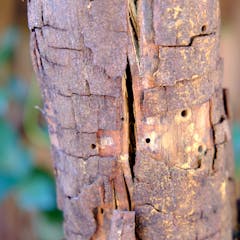
Articles on Fungi
Displaying 1 - 20 of 117 articles

Several Australians have been hospitalised after consuming ‘mushroom gummies’. This highlights the challenges of regulating products that fall somewhere between a food and a medicine.

Bushwalkers with smartphones could help scientists track a fungus lethal to many of Australia’s most loved trees.

Mycotoxins contamination causes health issues. Paying attention to storage of agricultural produce can save many lives.

The US Department of Agriculture has updated its plant hardiness zone map, which shows where various plants will grow across the country. Gardeners should take note.

Yes, you need to wash them but no, you don’t need to use micellar water to do it.

It’s a horror story unfolding in the west that could sweep across the country. Beware the shot-hole borer, an exotic pest that threatens our tree crops, plantations, urban forests and wild places.

Despite its 500-million-year history, the plant-fungi alliance holds mysteries that, once unravelled, could revolutionise agriculture and ecosystem management.

Students are invited to imagine how the social, political and legal landscape for cannabis will look in the future.

Hemp flowers and certain cannabis products contain fungal toxins, including Aspergillus and Fusarium, that can exceed acceptable regulatory levels.

One study found a zinc-containing gel stopped symptoms of thrush in the majority of women.

People who usually suffer from allergies are most at risk.

We’ve all heard of antibiotic resistance. The same thing is happening with other causes of infections in humans: fungi, viruses and parasites. This is making thrush and other infections hard to treat.

The microbiome and its signature smells are crucial for most organisms, whether human, insect or plant. The silent signals sent by the microbiome are essential communications that influence behaviour.

Africa is suffering from a silent, but costly, epidemic of fungal infections.

For decades, construction companies have used fireproofing chemicals associated with risks to human health and the environment. We need safer alternatives.

Usually, mould spores are invisible – but give them a niche to exploit and you’ll get all kinds of colours on the things in your home.

A microbiologist on the deadly germs lurking in your kitchen and why you need to wash tea towels and dishcloths more often.

The research conducted through biobanks can help to address challenges like climate change and food security.

New research about underground fungal filaments suggests these networks store a vast amount of carbon. All the more reason to preserve them.

Gardening is often seen as a relaxing, harmless pasttime – but that isn’t always the case.
